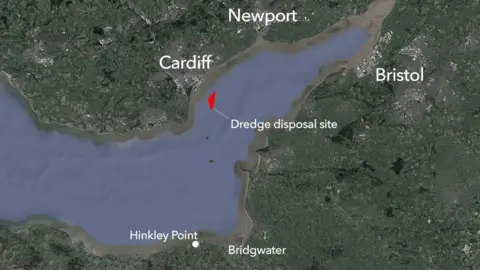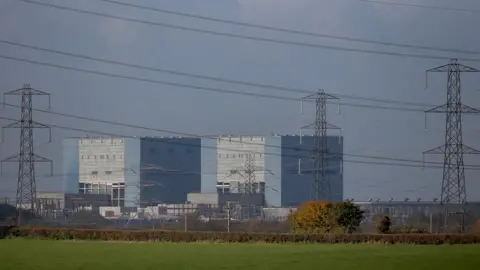Hinkley nuclear plant mud dump to be debated in Senedd
 BBC
BBCControversial plans to dredge mud from near the Hinkley Point nuclear site in Somerset and dump it off Cardiff Bay are to be debated in the Senedd.
The Assembly's Petitions Committee has been taking evidence on the issue and has requested the debate for all AMs.
Campaigners want the work postponed until further tests are carried out on the sediment.
The developer EDF said independent testing had shown the mud posed no risk to human health or the environment.
Environment watchdog Natural Resources Wales (NRW) has also insisted that it is "safe for disposal".
Approximately 300,000 tonnes of sediment needs to be dredged from alongside the Hinkley Point C construction site in Somerset so the new nuclear power station's water cooling system can be fitted.
In 2014 the developers were granted a marine licence to move that mud to a disposal site known as Cardiff Grounds, a little over a mile out to sea from Cardiff Bay.
Since then a campaign has raised concerns the mud could be contaminated by discharges of nuclear waste from the old Hinkley Point A and B plants.
Campaigners have alleged that testing of samples has been inadequate and there is insufficient evidence about how sea currents will move the sediment after it has been dumped.
Over 7,000 people signed a petition to the National Assembly calling on the Welsh Government to look again at the license, which was granted without a full environmental impact assessment.
Online petitions by Greenpeace and the Sum of Us website attracted a further 150,000 signatures.
 Getty Images
Getty ImagesThe petitions committee has been taking evidence from campaigners as well as EDF, NRW and UK government advisers CEFAS who carried out the testing.
AMs have decided to write a report on what they have heard and refer the issue for a full plenary debate in the Assembly.
As the dumping could happen within months, South Wales Central AM and petitions committee member Neil McEvoy called for the debate to be fast-tracked.
Aberconwy AM Janet Finch-Saunders said she felt the plans needed "to be widely discussed and debated by all Assembly Members".
The committee had requested that EDF consider further voluntary sampling of the sediment at depth.
However the developer said it did not consider it necessary "as there is no scientific basis for any additional sampling".
Anglesey AM Rhun ap Iorwerth said: "We as a committee have not been satisfied. We need to emphasize, from our point of view, why on earth would that testing not take place?"
'No risk'
Tim Deere-Jones, marine radiation consultant and prominent nuclear critic who has spearheaded the campaign against the dumping, said he was looking forward to the Assembly debate.
"The campaign believes that AMs will support our call for an environmental impact assessment to be carried out, in order to gather enough information to prove that the nuclear industry's dumping project will not degrade the Welsh coastal environment or the health and welfare of its population".
EDF said the mud posed no risk to human health or the environment and that independent testing by CEFAS showed the sediment was not classed as radioactive under UK law.
A spokesman said: "The original testing and radiological impacts were assessed using internationally accepted best practice and the original findings have been confirmed by the latest analysis."
NRW said last month that chemical and radiological results were within "acceptable, safe limits" and that the material was "suitable to dispose at the Cardiff Grounds site".
